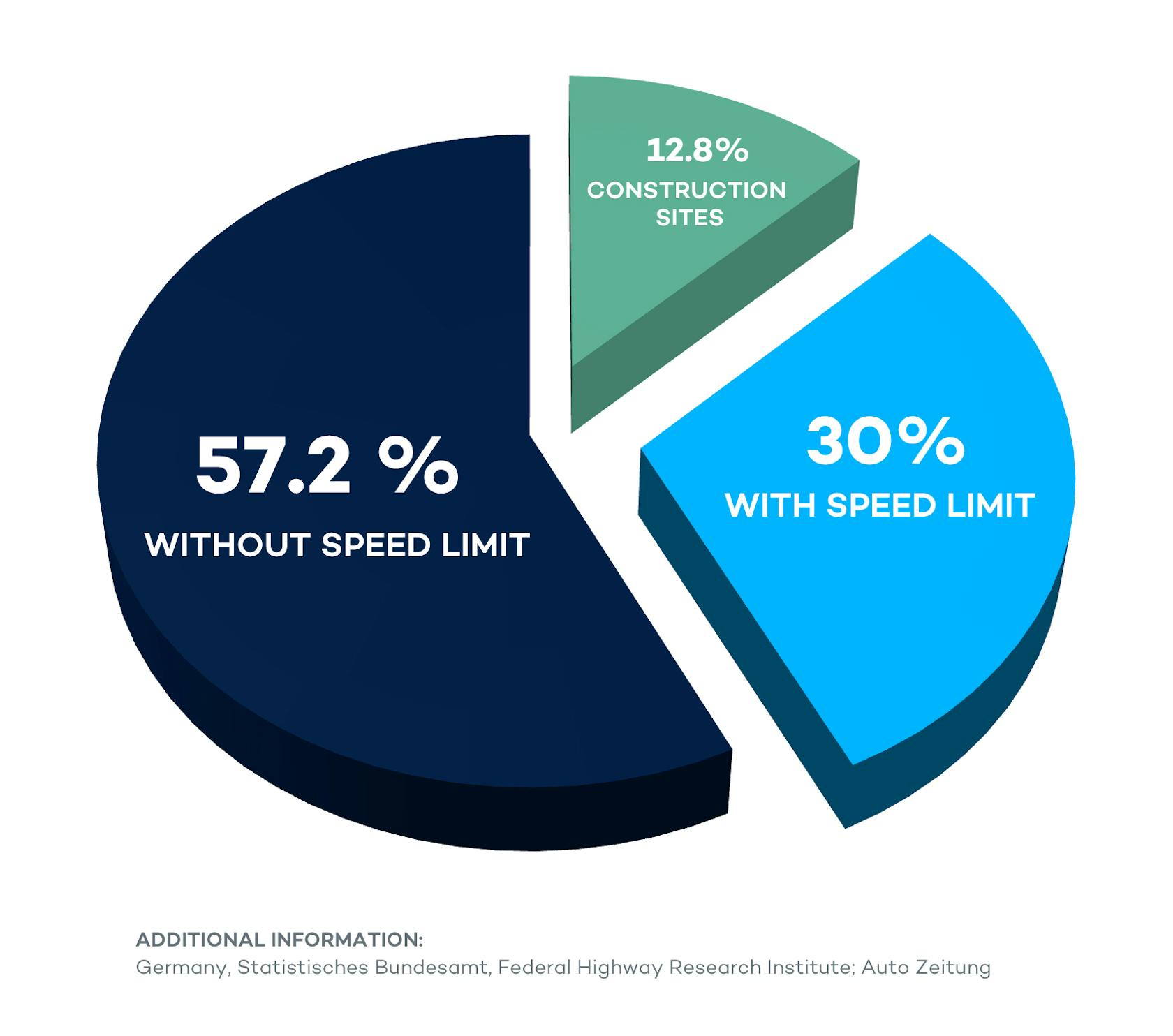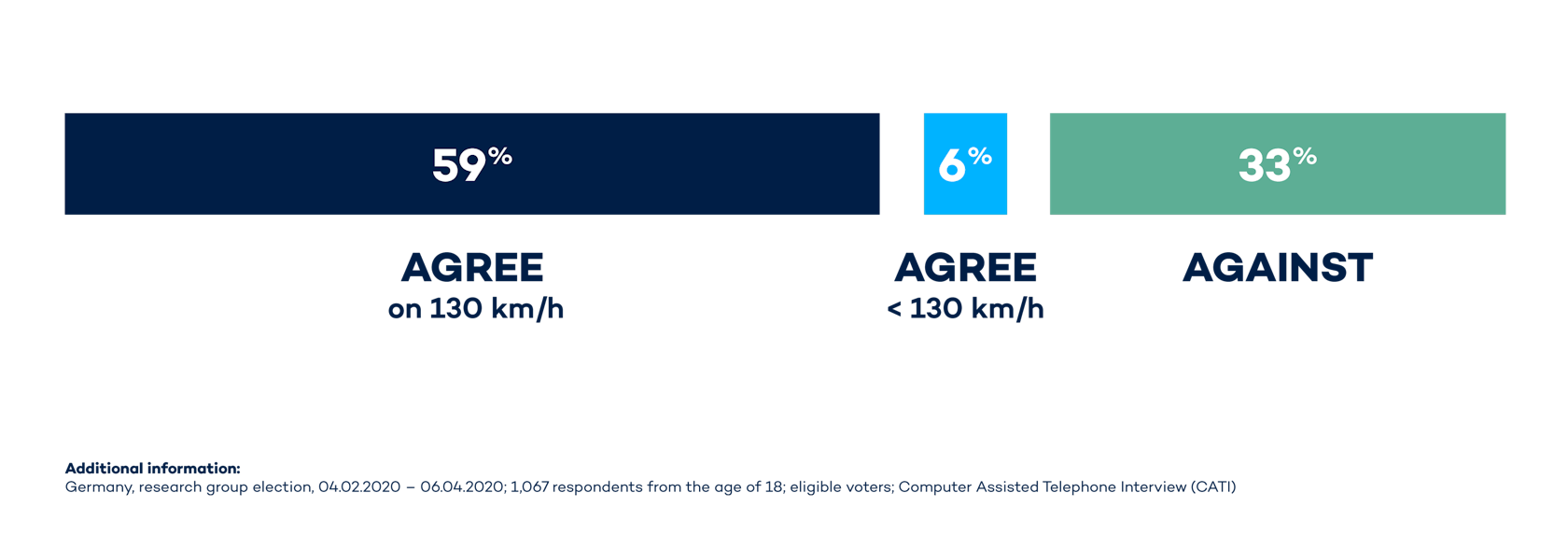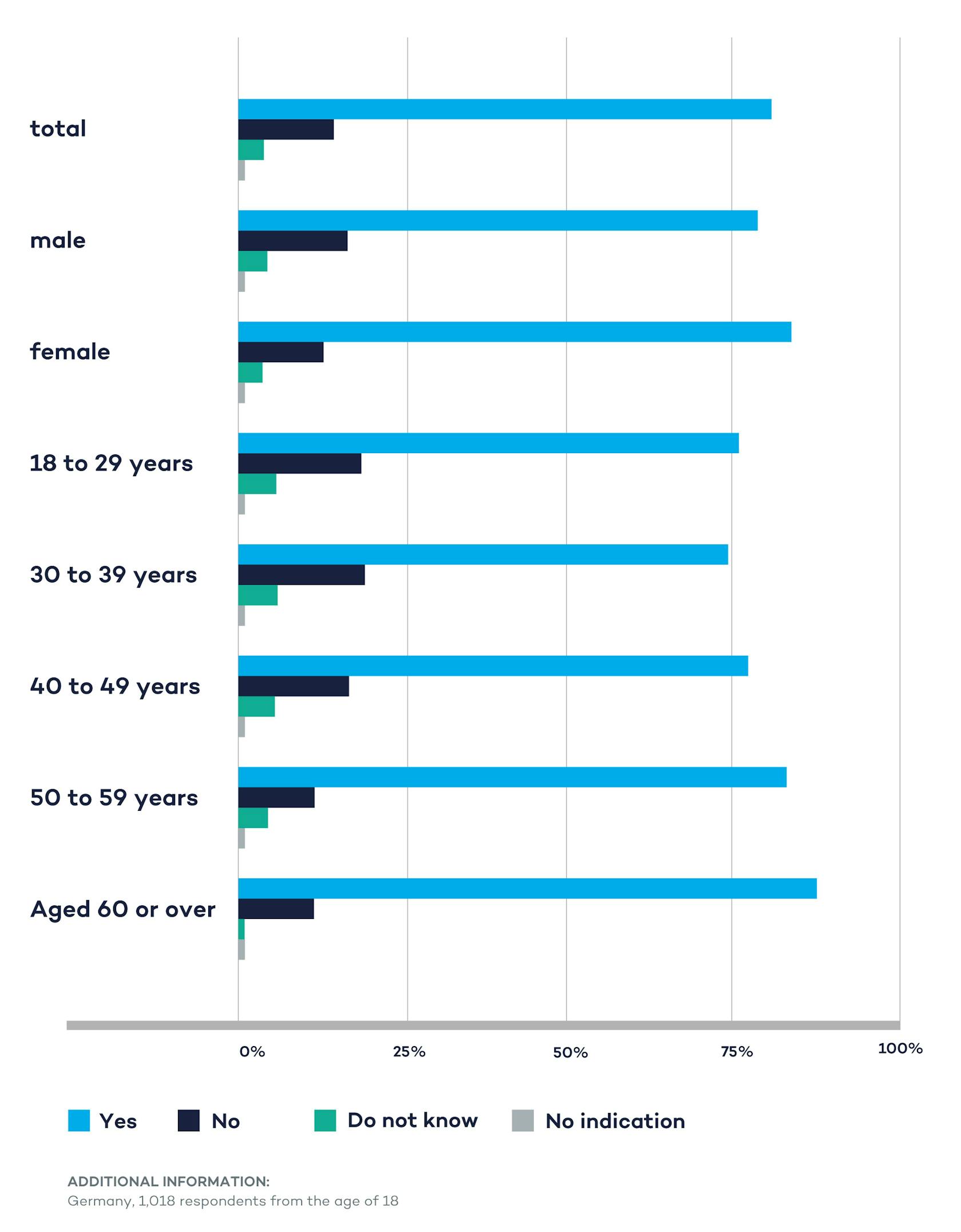Speed limits can help reduce fatalities and serious injuries on highways. The environment also benefits from a lower average speed, since it reduces the amount of CO2 pollution. But for speed limits to be fully effective, speed enforcement is absolutely critical. Modern solutions for traffic enforcement make a significant contribution to road safety and – contrary to popular belief – are considered necessary by a large part of the population.

Smart Mobility Putting Speed Limits to the Test
Why a maximum speed limit is a good idea on German roads.
For some people, being able to go as fast as they want on German Autobahns signifies a feeling of freedom. However, there are good arguments for adjusting the speed limit.
Germany is well known for the fact that there is currently no uniform speed limit on the highways. However the corona crisis has added many new facets to the discussion about speed limits and speed controls in Germany. On the one hand, the number of accidents has been falling due to the reduction in traffic. However, the empty streets have also come with drawbacks: We're talking about speeding. Obviously some road users are using the free space to drive much faster than allowed. For example, the Hanover police reported catching an unfortunate speeder who was driving on the A7 highway and clocked going 225 km/h in a 100 km/h speed zone.
More and more frequently, speeders could also be seen racing illegally and visibly enjoying this seemingly newly won freedom.
New aspects of an old debate
It’s clear that the debates on road safety, speed limits and adapted speed in Germany are ongoing. In recent weeks and months, the possible introduction of a general speed limit on German Autobahns in this context has dominated media coverage. What’s new is that the focus is no longer exclusively on reducing the number of accidents and thus fewer serious injuries and deaths. Now, the issue of climate protection has become part of the debate. For the first time, there are reliable calculations on the extent to which a reduced top speed can also have a positive effect on CO2 emissions.
A general speed limit on highways is a meaningful contribution to climate protection.
The Federal Environment Agency (UBA) believes that CO2 emissions can be substantially reduced by a general speed limit on highways. With a top speed of 120 km/h in place, calculations show that a 6.6 percent CO2 savings is possible.
This would entail savings of 2.6 million tons of greenhouse gas per year, just by limiting the maximum speed to 120 km/h. If the speed is reduced to a maximum of 130 km/h, emissions would still be reduced by 1.9 million tons. And if the vehicles were only allowed to travel at 100 km/h on the highway, this would result in an annual reduction in greenhouse gases of 5.4 million tons of carbon dioxide equivalents.
The German federal government bodies speak out against the speed limit
Even if the argument is conclusive from a climate point of view, the issue of imposing a general speed limit on highways has been the subject of eternal debate in Germany. Recently, the Federal Council's Environment Committee failed in its proposal for a speed limit of 130 km/h. The same fate befell the German Green party’s initiative in the German federal parliament at the end of 2019. Another German political party, the CSU (Christian Social Union), even started a campaign against any speed limits on Autobahns in Germany. One of the main arguments made by opponents is that the environmental effects of a speed limit are very small and that only 0.6 percent of CO2 emissions in traffic can be saved. As has been shown, the UBA's new calculations come to a completely different conclusion.
Germany is the only European country where there is no general speed limit on highways. As Statista's infographics show, other European countries have speed limits of 120 or 130 km/h. The permitted speed is even lower in Great Britain (112 km/h), Malta (80 km/h on highways), Norway (90 km/h), and Cyprus (110 km/h).
No more "open" sections on the Autobahn?
In the discussion about speed limits on Autobahns, it is repeatedly stated that there are fewer and fewer routes without speed limits anyway. But is that even true? In the period under review, January 2019, there was no speed limit on around 57 percent of the Autobahn kilometers in Germany. There was only a temporary speed limit due to construction work on about 13 percent of these roads. So sections with a speed limit only accounted for 30 percent of the Autobahn kilometers in Germany. A lot of arguments against a general speed limit are based on the feeling that the restricted sections of the routes already clearly predominate. But the facts paint a different picture.
Distribution of highway kilometers with and without speed limit and the acceptance of speed limits is increasing, if only gradually. Contrary to the common German opinion that driving equated to freedom, which should not be restricted, 59 percent of those surveyed voted for a speed limit of 130 km/h on Autobahns, according to the “Politbarometer”, a survey by Germany’s public-service television broadcaster “ZDF”, which polls the political mood of Germans. Only six percent were in favor of a speed limit of less than 130 km/h, and only one in three respondents thus categorically rejected a speed limit.
Despite a majority in favor of introducing a general speed limit on highways, there are some statements against it that you hear time and again. A closer look reveals whether they’re accurate, and if so, what there is to them.
Argument 1: Driving means freedom
"I will not allow any infringement of my personal freedom!" This is one of the most frequent statements made by people opposed to speed limits. In principle, however, German road traffic is one of the most heavily regulated areas of life. Every detail is defined by the legislator. There are regulations on parking, on the distance between vehicles when driving and on right of way. Practically the only thing that doesn’t exist is a general speed limit on highways. That's why people seem to cling to this little freedom, which is basically non-existent.
Argument 2: Only a few people drive faster than 130 km/h.
On the face of it, this statement is correct. The German Federal Highway Research Institute (BASt) analyzed the effects of a speed limit of 120 km/h on Autobahns between 2010 and 2014. That study showed that 60 percent of all motorists drive a maximum of 130 km/h. Another 15 percent hit their cruising speed at 130 to 140 km/h. A quarter of the road users drive faster than 140 km/h. The study comes to the conclusion that if the average speed were reduced, a speed limit of 120 km/h would make more sense because only seven percent of road users would then be driving faster than 140 km/h.
Argument 3: At a constant speed of 130 km/h, drivers’ concentration decreases.
With regard to this argument, it’s true that more concentration is needed at high speeds. This usually leads to improved concentration in the short term in order to be able to adequately cope with the immediate demands. The problem is that this high level of concentration cannot be maintained in the long term. This situation is aggravated by the fact that during rather monotonous highway trips, drivers are mainly occupied with monitoring tasks. These are generally difficult for people, especially over a longer period of time. The alertness of a driver then diminishes. This problem increases accordingly at higher speeds.
Argument 4: German Autobahns are the safest roads in the country.
In general, the number of fatal accidents has fallen dramatically over the decades. This has happened as traffic volume has increased. In 1970, 21,332 people died on German roads, but in 2019, that number was only 3,059, according to the German Federal Statistical Office. Country roads are still the leading sites for road users to have an accident. Here 1,867 people died in 2018.
This is hardly surprising, since many challenges that often lead to accidents on these roads don’t exist on the highways. No cyclists, no pedestrians, no crossing traffic and hardly any direct oncoming traffic. On the other hand, accidents on highways are particularly often fatal. In 2017, 409 people died on German Autobahns, almost half of them as a result of speeding. In addition, the fact-finding study, "Effects of a speed limit of 130 km/h on highways" by the German Road Safety Council (DVR) examined how many of the fatal accidents occurred on sections with and without speed limits. The number was significantly higher on routes without speed limits between 2011 and 2016 (in 2016: 283 versus 110).
Before-and-after trials in Germany, Sweden, Belgium, the US and Canada show that on all test routes where the speed was reduced, the number of accidents also fell. Where the speed increased compared to the previous situation, the number of accidents involving injuries increased.
Road safety is the top priority – and traffic monitoring is a must
Road safety is and remains the main argument for adapted speed and, if necessary, the introduction of a speed limit. It is reasonably certain that - whether or not there is a general speed limit - modern traffic enforcement is needed to safeguard sections of road defined as dangerous. German citizens are not at all averse to the use of speed measurement – despite the popular belief that they are. Drivers consider it necessary to monitor the speed of road users - according to a 2019 survey, more than 80 percent of those surveyed shared this opinion.
A solution for every application
For police and regulatory authorities as users of road safety technology, flexibility is an important argument. They benefit from solutions that can be used equally well on highways, country roads and in urban areas. For some years now, autonomous solutions that function largely automatically have been established, thereby reducing the personnel costs for the authorities. Not only can they be used flexibly on dangerous sections of highways with construction sites, they are also suitable for traffic enforcement at kindergartens and schools, as well as hazardous locations outside towns. Depending on their capacity, such systems can operate autonomously for up to ten days at a time.
Summary
In short
- Speed limits are a contribution to climate protection
- Speed limits are not rejected in Germany
- Road safety is the top priority
- Traffic enforcement is necessary









